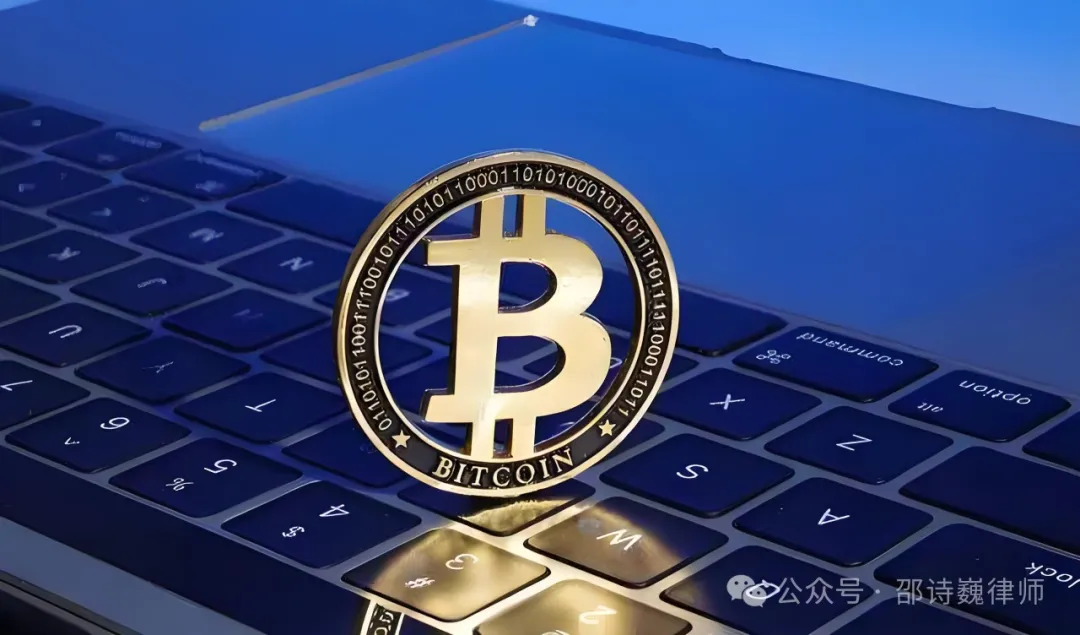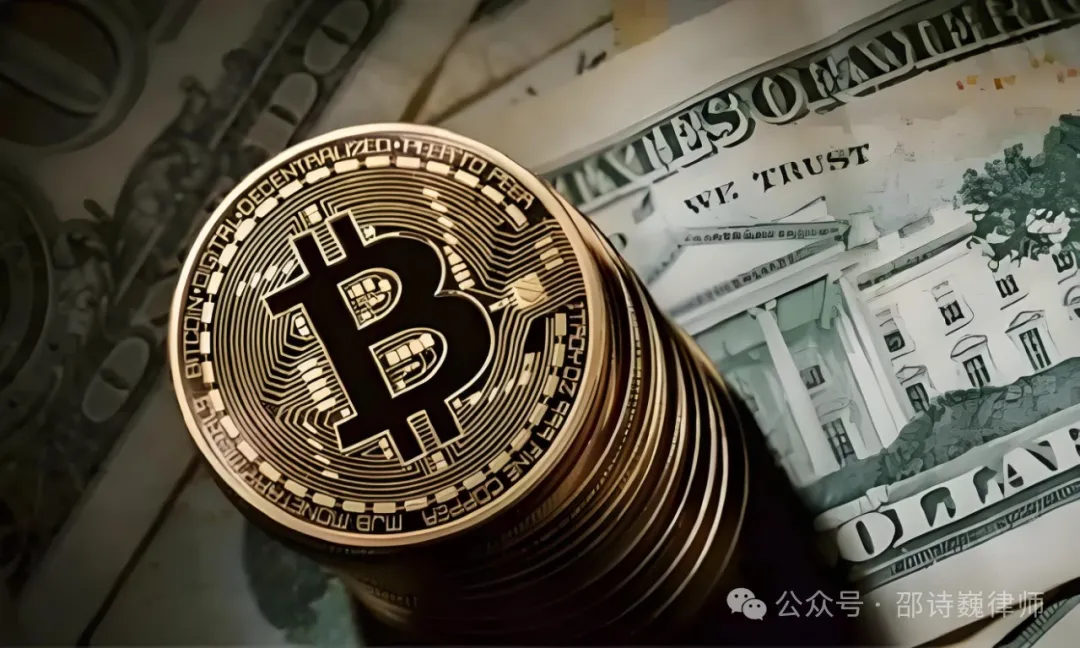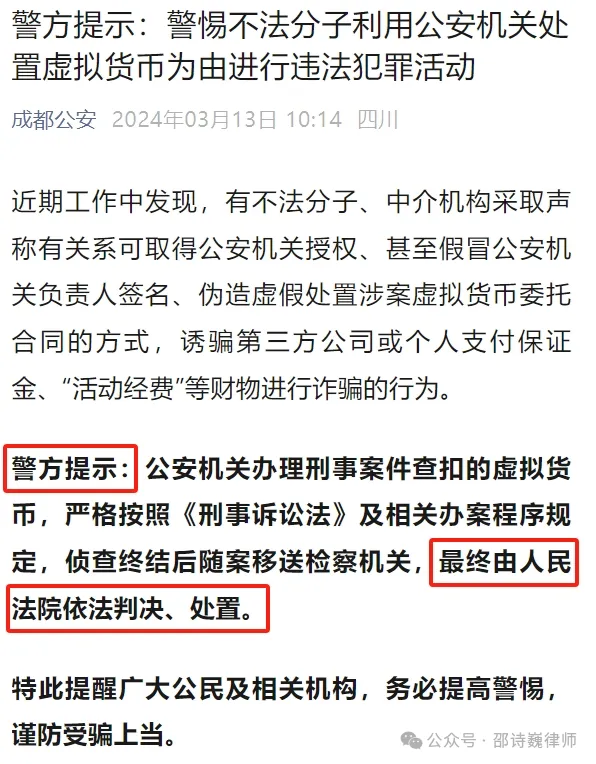Introduction:
Regarding criminal cases involving cryptocurrency, the judicial disposal of virtual currency is an unavoidable topic.
Recently, there have been numerous reports and developments on the disposal of virtual currency in criminal cases. On August 23, 2024, the Supreme People's Court issued the "2024 Annual Judicial Research Major Topic Bidding Announcement." On August 29, the Xuhui District Procuratorate and Xuhui District Public Security Bureau jointly signed the "Guidelines for the Disposal of Virtual Currency in Criminal Proceedings," and on September 3, the People's Court Daily published an article titled "Standardization of Judicial Disposal of Virtual Currency." These signs all indicate that judicial authorities in China are gradually strengthening their attention to and emphasis on the compliance of judicial disposal of virtual currency.
However, in judicial practice, before a final judgment is made in criminal cases, public security organs usually dispose of the involved virtual currency during the investigation stage. During the investigation stage of criminal cases, does the public security organ have a legal basis for the prior disposal of the seized virtual currency? What problems might the prior disposal behavior bring about? This article discusses these issues.
Authors: Shao Shiwei, Bao Jie, Lawyers
01. Common Scenarios
The following are common scenarios in the cryptocurrency circle involving criminal cases. Any resemblance is purely coincidental:
One day, A is suddenly visited by the police and informed that they may be related to a certain criminal case. The police request A's cooperation in the investigation, and A's mobile phone, computer, cold wallet, U card, etc., are taken away by technical personnel accompanying the police. After being taken to the police station/detention center, the police ask A to provide their digital wallet password and to sign an authorization letter agreeing to entrust a third-party company appointed by the police to dispose of the virtual currency held by A. Shortly after A signs the authorization letter (possibly while still in custody), the police inform A that their virtual currency has been sold by the disposal company for a discounted amount of xx RMB.

02. Exploration
1. Is there a legal basis for the prior disposal of virtual currency?
The seizure, freezing, and disposal of property involved in a case are mainly reflected in the following legal provisions. From this, it can be inferred that:
For deposits, remittances, bonds, stocks, fund shares, and other properties, only freezing measures can be taken (therefore, the judicial disposal of virtual currency can only take freezing measures).
Public security organs can only take freezing measures for the seized property and are not allowed to misappropriate or dispose of it on their own before a legally effective judgment is made by the court. However, there are also two exceptions:
- Except for property that should be returned to the victim or property that has been clearly proven to be unrelated to the case, it can be disposed of before the end of the litigation.
- For property that is perishable, easily devalued, or subject to significant price fluctuations, with the approval of the principal responsible person of the judicial organ at or above the county level, it can be disposed of in advance. However, there is a prerequisite: with the consent or application of the rights holder.
【Extended Thinking】
• The meaning of "property that should be returned to the victim or property that has been clearly proven to be unrelated to the case" obviously implies returning the involved funds or returning unrelated virtual currency to the victim. However, in judicial practice, the virtual currency that public security organs dispose of in advance may not necessarily have a victim (such as in cases involving pyramid schemes or gambling). In such cases, is there a legal basis for public security organs to dispose of virtual currency in advance?
• Does virtual currency fall under the category of "property with significant price fluctuations"?
• During the period of being detained, did the rights holder truly "voluntarily" agree or apply for a third-party company to dispose of their virtual currency? If not, what adverse effects might the prior disposal have on the rights holder?
Criminal Procedure Law
Article 245: Public security organs, people's procuratorates, and people's courts shall properly keep the property and its proceeds of criminal suspects or defendants that have been sealed, seized, or frozen for verification, make an inventory, and transfer them with the case. No unit or individual may misappropriate or dispose of them on their own. Legitimate property of victims shall be promptly returned. Prohibited items or items that should not be preserved for a long time shall be handled in accordance with relevant state regulations; after a judgment is made by a people's court, the property and its proceeds that have been sealed, seized, or frozen shall be handled in accordance with the judgment. Except for returning the proceeds of crime to victims in accordance with the law, all proceeds of crime shall be turned over to the state treasury.
"Regulations on the Application of Sealing and Freezing Measures by Public Security Organs in Handling Criminal Cases"
Article 3, Paragraph 3: Seized and frozen property involved in a case shall not be disposed of before the end of the litigation process, except for as otherwise provided by laws and regulations.
"Opinions on Further Regulating the Disposal of Property Involved in Criminal Proceedings"
- Improve the prior disposal procedures for property involved in a case. For property that is easily damaged, lost, or devalued and for property such as cars, boats, bonds, stocks, fund shares, the validity period of which is about to expire, and for which the market price fluctuates significantly, with the consent or application of the rights holder and the approval of the principal responsible person of the public security organ, state security organ, people's procuratorate, or people's court at or above the county level, it can be sold, realized, or disposed of in advance in accordance with the law. The proceeds shall be uniformly deposited into a single compliant account of each unit. The prior disposal of property involved in a case shall be conducted openly and fairly.
2. What related issues might the prior disposal of virtual currency bring about?
• What impact might the prior disposal behavior have on criminal cases?
Because lawyers have not yet seen the criminal case file before it is transferred to the procuratorate for review and prosecution, and without a complete and comprehensive analysis of the facts of the case, the parties cannot clearly understand whether their behavior indeed constitutes a criminal offense, whether there is evidence to support the charge, and whether the amount of money involved in the criminal charge as alleged by the judicial authorities is accurate. Is there any property that should be excluded, such as legal income, property unrelated to the case, or property of third parties? Even at the procuratorate stage, for cases with disputed aspects, there is a possibility of non-prosecution by the procuratorate or withdrawal of the case by the public security organ. In such a situation, if the public security organ has already disposed of the involved virtual currency during the investigation stage, and even spent it, how will the case proceed? It may only be pushed forward forcibly—transferred to the court (this can only be inferred and cannot be elaborated on here).
Before the case is transferred to the court for trial, the specific amount that should be returned to the victim or the illegal gains that should be recovered and confiscated have not been finally determined, and there may be other legal rights holders of the virtual currency involved in the case. In this situation, the prior disposal behavior of the public security organ during the investigation stage clearly violates the aforementioned procedural regulations.
• What "troubles" might the prior disposal behavior bring about?
Of course, if the suspect voluntarily surrenders the property involved in the case and applies for it to be disposed of by the public security organ or a third-party disposal company, it may satisfy a certain degree of procedural compliance. However, based on the practical experience of handling cases involving cryptocurrency, this is only superficial procedural "compliance," but it may lead to "endless troubles" in the future.
Because the suspect is in a state of anxiety and fear while being detained or on bail, constantly worrying about the huge psychological pressure of facing several years of imprisonment every day, the "voluntary agreement" to authorize a third-party disposal company to dispose of their virtual currency is made out of a desire for freedom. The real reason for this "voluntary agreement" at this time is the desire to quickly escape from the current "predicament," rather than a "voluntary agreement" based on a clear determination of the facts of the case by the court, sufficient evidence, and the final outcome of the criminal judgment, with no further appeal by the defendant and the end of the case.
Therefore, the "troubles" for the public security organ may be continuous petitions from the parties, applications for retrials, and administrative lawsuits demanding compensation from the public security organ for improper sale prices and resulting losses.
• Will the prior disposal of virtual currency increase the criminal risk for the parties involved?
Third-party disposal companies are generally companies that cooperate with public security organs, and in practice, they usually agree on disposal fees ranging from 15% to 30%. For the parties involved, they only have the right to sign an authorization and do not have the ability to choose a disposal company, negotiate, or revise the terms of the contract to protect their own legal rights and interests.
In practice, the risk of buying and selling virtual currency is actually very high, ranging from freezing of accounts to involvement in criminal offenses. Moreover, the amount of virtual currency to be disposed of in criminal cases is often not low, with amounts in the tens of millions or even hundreds of millions being normal. There are not many OTC merchants in China with such large amounts of funds on a daily basis. Those who can produce a large amount of cash in the short term are highly likely to be related to underground banks. In addition, in practice, disposal companies cooperating with public security organs will also bring the money back from abroad through fictitious export trade and remittance through the State Administration of Foreign Exchange, making the money "legally" return to China.
As a result, the parties involved may also face the risk that if the RMB realized by the disposal company contains stolen funds or illegally exchanged funds, who will bear this risk—the disposal company, the public security organ, or the parties involved? Will the parties involved be "further guilty," adding charges such as aiding and abetting, concealing, or illegal business on top of the original charges?

03. Viewpoint: Public Security Organs Should Not Priorly Dispose of Virtual Currency Before a Legally Effective Judgment is Made by the Court
Public security organs usually consider several factors when they priorly dispose of virtual currency during the investigation stage: the significant fluctuation in the value of virtual currency, the need to determine the value of the virtual currency before a court judgment, the possibility of third-party transfer of the virtual currency in the case, and the necessity of prior disposal for security reasons, among others. We will discuss these issues as follows:
1. Does virtual currency fall under the category of "property with significant price fluctuations"?
In practice, public security organs consider that the value of virtual currency is significantly affected by market fluctuations, and therefore, they priorly dispose of virtual currency during the investigation stage. However, this viewpoint does not seem to be entirely logical.
For cryptocurrencies such as Bitcoin, Ethereum, and meme coins, their market value is indeed significantly affected by market fluctuations, and public security organs have legal grounds to dispose of the property based on the significant price fluctuations.
However, in most cases involving cryptocurrency, the currency being handled is USDT, a stablecoin issued by Tether Limited, whose value is pegged to the US dollar. Therefore, is it appropriate to priorly dispose of stablecoins based on significant price fluctuations? This is open to debate.
2. Will not priorly disposing of virtual currency affect the court judgment?
In practice, there is also the viewpoint that in criminal cases, the amount involved is the standard for convicting and sentencing the parties involved, and the illegal gains of the defendant need to be turned over to the state treasury. Therefore, there is a necessity for public security organs to priorly dispose of virtual currency during the investigation stage. However, we do not agree with this viewpoint.
Announcements and notices related to virtual currency issued in China all stipulate that "no organization or individual may provide pricing services for virtual currency." Therefore, regardless of the pricing method, it violates China's regulatory policies. However, as a virtual commodity, its property attributes are recognized in China, and in criminal cases, the amount involved is also one of the factors considered by judicial authorities in convicting and sentencing the parties involved. Therefore, in some cases involving cryptocurrency, the value of the virtual currency needs to be determined before a court judgment.
In a previous article, Lawyer Shao mentioned in "How to Determine the Price of Stolen Virtual Currency" that the current commonly used methods for determining the price of virtual currency in judicial practice are:
- Reports from pricing agencies and judicial appraisal agencies;
- The consideration paid to purchase the virtual currency;
- The consideration received from the realization of the virtual currency;
- Reference to prices on mainstream virtual currency exchanges;
- Discretionary consideration by the court without calculating the value.
Not all cases involving cryptocurrency require the determination of the price of virtual currency. For example, in the case of theft (2020) Yue 0304 Criminal Preliminary No. 2, the court judgment only vaguely mentioned the discretionary consideration of the number of virtual currencies stolen by the defendant.
If the case involves stablecoins such as USDT, the aforementioned methods 1, 2, and 4 can be used as references for the amount involved. There is no necessity to priorly dispose of and realize the virtual currency during the investigation stage.
Furthermore, although the court judgment needs to address the recovery and confiscation of the property involved in the case, in practice, many judgments are quite general. For example, "illegal gains shall be confiscated," "continue to recover illegal gains," or even in the case of aiding and abetting (2023) Min 0524 Criminal Preliminary No. 1300, the judgment directly described the confiscation of the detained USDT coins.
From this, we can conclude that whether public security organs priorly dispose of virtual currency or not will not affect the subsequent court judgment.
3. Will there definitely be security risks if prior disposal is not carried out?
The security of virtual currency is also one of the factors considered by public security organs when priorly disposing of virtual currency in a case.
If one has the private key and mnemonic phrase corresponding to a digital wallet, they have the right to dispose of the virtual currency. Therefore, if someone other than the suspect also has the private key and mnemonic phrase for the wallet, there is indeed a possibility of the virtual currency being transferred.
However, if the public security organ has obtained the suspect's private key and other information, it is certainly provided by the suspect. In this case, if the public security organ has control over the suspect's digital wallet and exchange accounts, the investigators can directly transfer the virtual currency to a cryptocurrency wallet account controlled by the public security organ (although this may also be legally unsupported, it is indeed practiced. We believe that even if the virtual currency is temporarily stored in the personal wallet accounts of relevant personnel in the public security organ, it is still more compliant than directly disposing of the virtual currency). As for security issues, public security organs can use multi-signature wallets to prevent internal personnel from embezzling.

04. Prior Disposal of Virtual Currency May Breed Rent-Seeking and Judicial Corruption
From the relevant legal provisions listed at the beginning of this article, it can be seen that before the end of the litigation process, public security organs only have the right to take freezing measures for the property involved in a case, and "freezing is the principle, and prior disposal is the exception."
The primary responsibility of public security organs should be to investigate crimes, not to directly handle the property involved in a case. The handling of the property involved in a case needs to be done within the legal framework, after a legally effective judgment, and through judicial procedures, with the property being realized by the court enforcement bureau. Let's look at the following two vivid examples, which will better illustrate that only a compliant disposal method can guarantee the fairness and legality of criminal proceedings.
Case One: Rent-Seeking by Public Security Organ Investigators
In May 2024, the People's Procuratorate of Nanjing City released a case in which Hai, a member of a certain public security bureau, was mainly responsible for monitoring illegal activities on computer information networks, investigating cases of cybercrime, etc. Defendant Hai took advantage of his position and, through his subordinate Wu, obtained electronic data related to Bitcoin in the case and sent the data to his friend Ji (the head and technician of a certain network technology company). Later, Ji cracked the Bitcoin key and stole some of the Bitcoin, and Hai acquiesced to this behavior. After the incident, Hai did not report the discovery in a timely manner but instead repeatedly demanded cash and Bitcoin from Ji. After the case, the investigating unit realized the Bitcoin, obtaining more than 482.272 million RMB.
Case Two: Embezzlement of Virtual Currency Assets by a Security Company
In April 2021, according to media reports, the CMO of a blockchain security company in Chengdu embezzled the digital currency assets temporarily stored by the police in the company, shorting Bitcoin and incurring losses of up to 300 million RMB. The incident began when the Token Better digital currency exchange was investigated for involvement in pyramid schemes in November 2020, and the main person in charge, Xiong, and others were criminally detained. Nearly 300 million worth of illegal digital assets were seized, and due to their special nature, they were temporarily stored by a blockchain security company in Chengdu at the request of the police. Recently, when the economic investigation team went to the company to settle accounts, they found that nearly 300 million in digital assets had disappeared. After an investigation, it was found that this money was illegally embezzled by the company's CMO, Gao, taking advantage of his position. According to reports, Gao used the digital assets to engage in high-risk leveraged short contracts on Bitcoin and all of them were liquidated.
Due to the lack of explicit legal guidelines, the judicial disposal of virtual currency has always been in a state of unregulated growth in practice. There are urgent compliance issues regarding the ownership identification, value assessment, and realization methods of virtual currency. Countless investigation and disposal companies, as well as scalpers, are eyeing this highly profitable opportunity (for example, the well-known Plus Token case, in which a certain disposal company made tens of billions in revenue). Therefore, there are too many people in the market trying to get a piece of this lucrative opportunity, and of course, there are even more scammers.
If the public security organs continue to be able to priorly dispose of virtual currency based on a mere authorization from the suspect, this judicial chaos will lead to more legal problems. In March 2024, the Chengdu Public Security Bureau issued a warning, which also mentioned that "unlawful individuals and intermediary organizations claim to have connections to obtain authorization from public security organs, or even forge false disposal contracts for virtual currency cases, deceiving third-party companies or individuals into paying deposits or 'activity funds' for fraudulent activities." Additionally, the Chengdu Public Security Bureau also emphasized that "virtual currency seized by public security organs in the handling of criminal cases… will ultimately be disposed of by the people's court in accordance with the law."

05. Conclusion
As a new and emerging field, the issue of judicial disposal of virtual currency has not yet been addressed by regulatory authorities in China. Therefore, law enforcement officers have had to explore feasible solutions in practice, leading to a series of potential legal issues.
As emphasized in an article by the People's Court Daily titled "Standardization of Judicial Disposal of Virtual Currency," the current disposal of virtual currency faces multiple challenges such as ownership identification, value assessment, and legal realization. Therefore, it is necessary and urgent to promptly issue comprehensive guidance on the judicial disposal of virtual currency. Only by providing a legal basis for disposal actions can the judicial organs ensure that their litigation work is based on the law and effectively safeguard the legitimate rights and interests of the parties involved from the source.
免责声明:本文章仅代表作者个人观点,不代表本平台的立场和观点。本文章仅供信息分享,不构成对任何人的任何投资建议。用户与作者之间的任何争议,与本平台无关。如网页中刊载的文章或图片涉及侵权,请提供相关的权利证明和身份证明发送邮件到support@aicoin.com,本平台相关工作人员将会进行核查。




